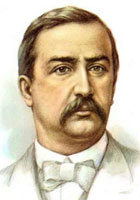
Alexander Porfiryevich Borodin (12 November 1833 – 27 February 1887)
Alexander Porfiryevich Borodin (12 November [O.S. 31 October] 1833 – 27 February [O.S. 15 February] 1887)
Alexander Borodin was a well-known music composer, doctor, chemist and philanthropist. He developed an interest towards chamber music while pursuing his chemical studies. He composed many symphonies, out of which Prince Igor is considered to be his best work.
Contents
BIOGRAPHY
Considering the popularity of Borodin’s colorful music, one is always surprised when reminded just how little he was able to produce in a busy and abbreviated life.
Family
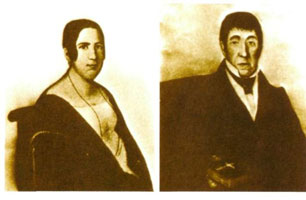
Borodin’s parents. Avdotya Konstantinovna Antonova and Luka Stepanovich Gedianov. Photos from lost portraits by Andrey Denyer, 1840.
Alexander Porfiryevich Borodin was born in St. Petersburg. He was an illegitimate son of a 62-year-old Georgian nobleman, Luka Gedianov (or Gedevanishvili), and a young wife of a military doctor, Avdotya Antonova. Alexander Borodin was officially registered as the son of his father’s serf, Porfiry Borodin. He remained his father’s serf until 1840, when Luka Gedianov, just before his death, freed the seven-year-old boy. His biological father bought Alexander and his mother a large four-storey house where he spent his childhood.
Childhood and early education
Aleksander Borodin was a weak, unhealthy child and received home education from experienced and knowledgeable tutors, which allowed him to study all of the subjects of a gymnasium course. Borodin was fluent in many languages such as Russian, French, English, Italian and German. Despite his weak constitution and poor health he was a very enthusiastic child, and took interest in chemistry, modeling and painting. He showed an intense interest in music, learned to play the flute, picked up the rudiments of piano apparently on his own, began composing at the age of eight without instructions, and in his teens taught himself to play the cello.
His first musical composition, which he wrote when he was nine, was inspired by his first love, a grown woman named Elena. In her honor he wrote the polka Helen. As a child, Borodin was a friend of Mikhail Shchiglev, who later became a music teacher and a specialist in folk and church music. Together they studied sciences and music. At the age of 13, Borodin wrote a concert for flute and piano and a trio for two violins and violoncello and at 14, made his first attempts at writing music for a chamber band.
Career as a chemist and music
However, his main passion was not music but chemistry, which later became his profession. Borodin decided to become a physician. In 1850 he was admitted to the Academy of the Medicine and Surgery in St. Petersburg. While working hard on science, Borodin never left music and used every opportunity to enrich his musical education. He took part, as a violoncellist, in concerts in the homes of his acquaintances. Borodin liked to spend evenings with his friends listening to the romances of Alexander Alyabyev, Alexander Varlamov, Aleksander Gurilyov and Constantin Wilboa. During his studies at the academy, Borodin also wrote songs, chamber music and piano pieces. He graduated in 1856 with high honours and served for two years as a teaching assistant at the Academy, during which time he presented an imposing research paper at a professional conclave and at the end of which he awarded his M.D. On graduation he spent a year as surgeon in a military hospital, followed by three years of advanced scientific study in Western Europe. In 1859-1862 Borodin was in France, Italy and Germany.
Friendship with Mendeleyev, Savich and Olevinskyi
Almost immediately after his arrival in Heidelberg, Germany, Borodin made friends with talented young chemists Savich, Olevinskyi, Mendeleyev. Borodin and Mendeleyev became lifelong friends. The life of young scientists in Heidelberg proceeded in a tense scientific work. In the evenings they gathered at one of their friends and listened to music. Low income didn’t prevent them from attending concerts and opera performances in other cities. By that time the young scientist Borodin had already written several romances, instrumental pieces, ensembles. Some of his piano pieces were even published. In Heidelberg, Borodin composed mainly chamber-instrumental ensembles: a piano trio, a sextet, a string quintet. They were immediately performed at the musical evenings.
Personal life
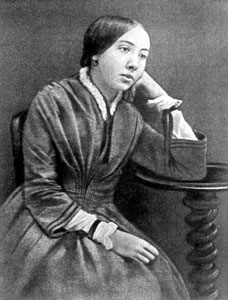
Borodin's wife, Ekaterina Protopopova
In the summer of 1861, in Heidelberg, Aleksander Borodin met the talented amateur pianist Ekaterina Protopopova, who was sent there for treatment, and whom he later married. A wonderful performer of the music of Chopin, Schumann, Liszt, she opened for Borodin an unknown world of romantic composers. In autumn, her health seriously deteriorated and she had to continue treatment in Italy. Borodin followed Ekaterina to Pisa without interrupting his chemical research. In Pisa he made the discoveries that brought him world-wide acclaim. In Italy Borodin composed his piano quintet.
The Five or the Mighty Handful
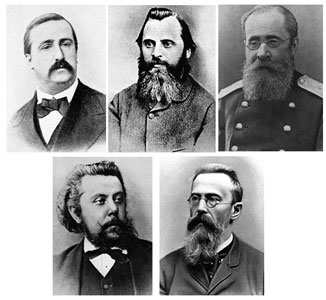
Balakirev Circle (The Mighty Handful)
Aleksander Borodin, Mily Balakirev (the leader), César Cui, Modest Mussorgsky, Nikolai Rimsky-Korsakov
In 1862 Borodin came back to Saint Petersburg, where he was made adjunct professor of chemistry at the Academy, where he fell in with Balakirev Circle (later known as ‘The New Russian School’ or ‘The Mighty Handful’). Five prominent 19th-century Russian composers (Mily Balakirev (the leader), César Cui, Modest Mussorgsky, Nikolai Rimsky-Korsakov and Alexander Borodin) worked together to create a distinctly Russian classical music. Borodin’s musical work was never more than relaxation from his scientific work. A notable advocate of women’s rights, Borodin was a promoter of education in Russia. He was one of the founders of the School of Medicine for Women in St. Petersburg, where he taught. He tried to make higher education available for Russian women.
Orchestral works and opera
Under the goad of Balakirev, Borodin completed the Symphony No.1 in E-flat Major, it was first performed in 1869. In that same year Borodin started on his Symphony No.2 in B Minor, when he also began work on his operatic masterpiece, Prince Igor (completed posthumously by Rimsky-Korsakov and Aleksandr Glazunov). Act II of Prince Igor contains the often-played Polovtsian Dances. He also found time to write two string quartets, a dozen remarkable songs, the unfinished Symphony No.3 in A Minor, and his tone poem In the Steppes of Central Asia. This orchestral work represents an interaction of Russians and Asians in the steppe lands of the Caucasus.
Borodin’s fame outside the Russian Empire was made possible during his lifetime by Franz Liszt, who arranged a performance of the Symphony No. 1 in Germany in 1880. In 1885-1886 Borodin was at the “Russian concerts” in Liege, Belgium, held at the initiative and with the assistance of the Comtesse de Mercy-Argenteau, an avid lover of Russian music. Thanks to her compassion and the promotion of Borodin’s works, he dedicated to her seven short piano compositions under the common name Petite Suite (The Little Suite) and the romance Septain (The Septenary), which is known in Russia as The Wonderful Garden (Chudnyi Sad).
Deteriorating health and death
The 1880s were a grimmer period. Driven and overworked, Borodin suffered several heart attacks and survived a bout of cholera. His wife’s declining health forced her to live in Moscow, where twice, in 1886, her life was despaired of. On the evening of February 27 he celebrated Maslenitsa with his friends, just after midnight in mid-conversation with a group of guests, he fell dead. He had just turned fifty-four.
Borodin’s compositions place him in the front rank of Russian composers. He had a strong lyric vein but also was noted for his handling of heroic subjects. He had an unusually fine rhythmic sense and excelled in the use of orchestral colour and in the evocation of distant places. In his symphonies and string quartets – among the finest of the Romantic era – he developed a formal structure in which the musical material of a movement was derived from a single initial motif. His melodies reflect the character of Russian folk melodies, and like other composers of the Russian national school he used striking harmonies unconventional in western European music. (source link: https://www.britannica.com/biography/Aleksandr-Borodin)
WORKS:
PRINCE IGOR

The Tale of Igor’s Campaign. Artist: Ivan Golikov,1934
A remarkable work of ancient Russian literature of the 12th century The Tale of Igor’s Campaign fascinated Borodin and inspired him to create an opera. The composer incorporated material drawn from two medieval Kievan chronicles. “The Tale of Igor’s Campaign” tells about the unsuccessful campaign of the brave prince Igor against the Polovtsians (The Cumans). Internecine strife of the appanage princes, their feuding and disunity weakened Rus’. The author of The Tale of Igor’s Campaign urged the Rus’ princes to unite. The enormous progressive role of this work was in the patriotic orientation.
Vladimir Stasov, a respected music and art critic of that time, suggested that Borodin should write an opera to the plot of The Tale of Igor’s Campaign. He also sketched the first scenario. In subsequent years Vladimir Stasov helped Borodin a lot in his work on the opera searching information in the libraries, collecting the materials on the history of Kievan Rus’, ancient Russian songs and melodies of Eastern peoples.
Prince Igor is a lyric-epic opera in four acts with a prologue. The music of the opera is based on the intonations of Russian and Oriental folk songs. Central to the opera is the way the Rus’ people are distinguished from the Polovtsians through melodic characterization. While Borodin uses features of Russian folk music to represent his compatriots, he uses chromaticism, melismas and appoggiaturas – among other techniques –represent their ‘heathen’ opponents. These methods had already been used by Glinka and others to portray Orientalism in Russian music.
Synopsis
Prologue
The square in Putivl. Together with his son, Vladimir, Prince Igor gathers his army for a military campaign against the Polovtsians. The people sing the praises of the prince and his warriors and wish them to defeat the enemy. Suddenly, a solar eclipse begins. An incomprehensible phenomenon seems to be a bad omen. The people and Igor’s inner circle of boyars (nobles) plead with him to postpone the campaign, but he reassures the people:
“We go forth in a righteous cause, to fight for God, for faith, and home”.
Unnoticed by the army, two soldiers Skula and Yeroshka desert feeling sure that Vladimir Yaroslavich, Prince Galitsky, will offer them work more to their liking. Igor’s wife, Yaroslavna, pleads with Igor to remain at home, but he cannot be persuaded. The Prince bids farewell to her and leaves her to the care of her brother, Prince Vladimir Galitsky, who tells of his gratitude to Igor for sheltering him after he was banished from his own home by his father and brothers. The people sing the praises, the army of Igor and Vladimir sets out on their campaign against the enemy. The solemn folk chorus “To the, sun in his glory, all hail!”, framing the prologue, is based on the melodic turns of Russian songs. In its form it is similar to the majestic chorus of Glinka’s operas. The chorus praises Igor and his son, singing the praises of his squad. The people wish Igor good luck and success in the campaign. The melody of the chorus is similar to the melodies of ancient ritual and epic Russian songs:
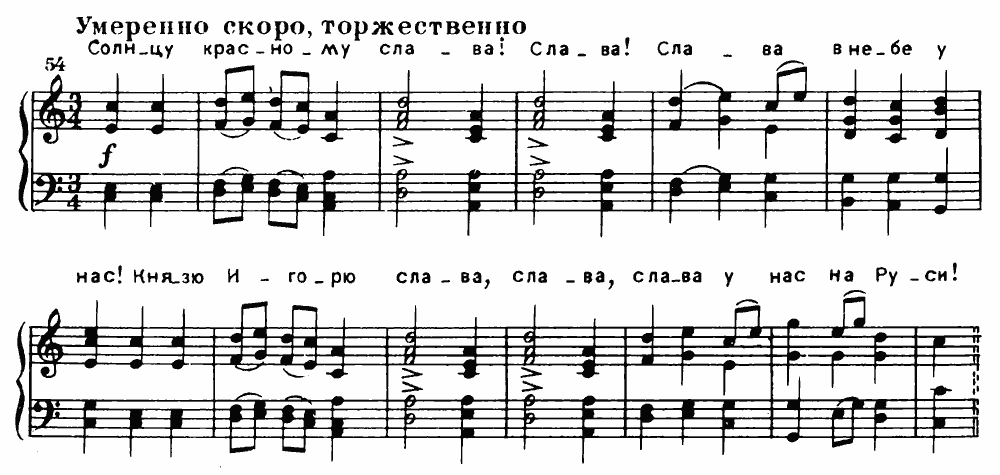
Prince Igor (Prologue) score
The scene of the solar eclipse plays an important role in the development of the action. In folk epic poetry, various dramatic events of people’s lives were often compared with the mighty and formidable phenomena of nature. The musical means of the eclipse scene are unusual. The harmonic and melodic language of this episode is based on the sound of an increased triad.
Act I
Scene 1: The court-yard of Galitsky’s house
The guests are having a drunken feast. Skula and Yeroshka are now working as gudok-players. They are drinking, jesting and singing of how Galitsky’s men abducted a young maiden and how she pleaded to be allowed to return to her father without being dishonoured. Galitsky dreams of becoming a prince of Putivl. His song is a description of a frivolous person, who is only interested in reckless festivities. The distinct character of this song is emphasized by sharp accents accompanied by a dashing dancing rhythm.

Prince Igor (Galitsky’s Song) score
The young maidens come directly to Galitsky in a desperate attempt to save their friend, but the mob laughs at them, chasing them away. Drunken guests praise the prince.
Scene 2. A room in Yaroslavna’s palace
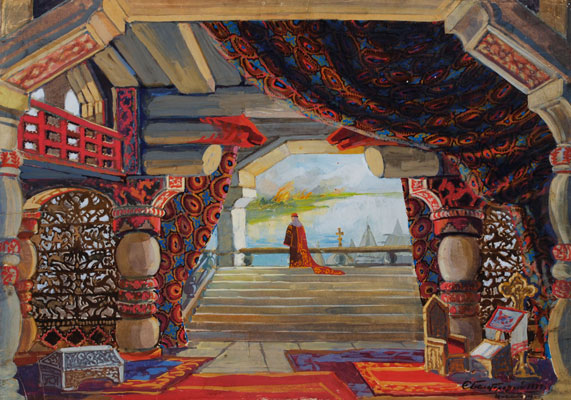
A room in Yaroslavna’s palace.
Yaroslavna is alone, lamenting Igor’s absence. Terrible nightmares and dark premonitions haunt Yaroslavna. There has not been any news from Igor for a long time. The nurse brings in the young maidens who tell Yaroslavna of their abducted friend. They ask Yaroslavna to intercede and demand that the girl be returned to them. Yaroslavna doesn’t have the power to deal with her brother.

Prince Igor (The young maidens ask Yaroslavna to intercede and return their abducted friend) score
Galitsky enters and the young maidens run away frightened. Yaroslavna asks him for an explanation of his misdeeds but he only laughs at her. Galitsky behaves impertinently with his sister trying to threaten her. Yaroslavna questions him as to the truth of their story and he mocks her saying she should treat him as a guest in her house. Yaroslavna threatens him with sending him back to their father and demands to return the girl. Galitsky replies that he will return the girl but will take another later and leaves. The boyards come in and tell the princess that Igor is wounded, and, together with his son, is a prisoner in the enemy’s camp. The chorus sounds harsh, restrained and even gloomy. The sound of the male voices in the low register, the strict and measured accompaniment of the orchestra create the impression of inexorably impending misfortune:
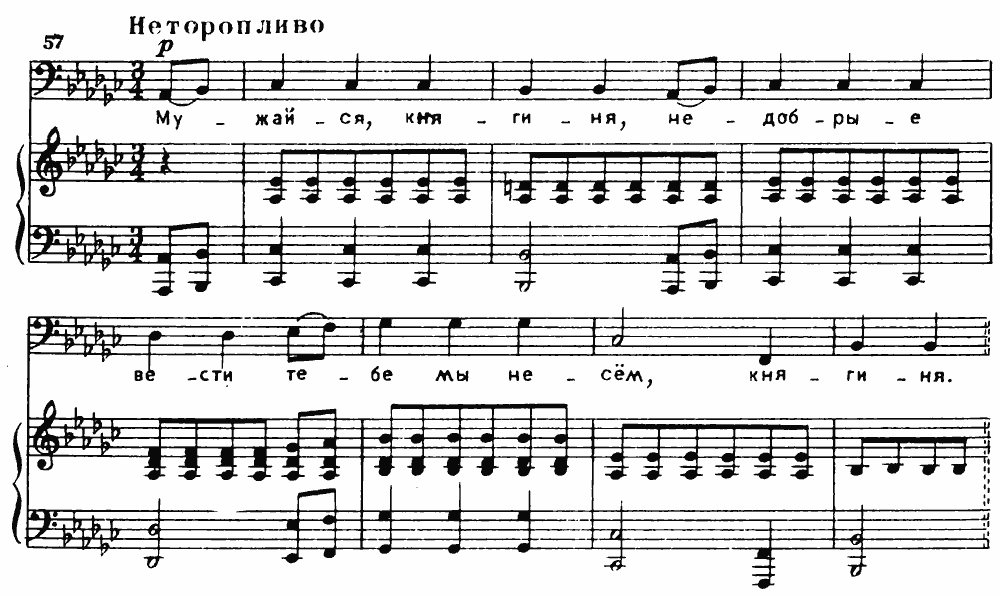
Prince Igor (The boyars bring Yaroslavna the tragic news) score
Yaroslavna is desperate, but the boyars try to comfort her. While they are deliberating on a plan of action the tocsin rings the alarm. Flames are seen in the distance. The Boyards draw their swords in defense. The women start wailing.

The Polovtsian camp. Stage design for the opera Prince Igor by A. Borodin, 1930. Artist: Bilibin, Ivan Yakovlevich
Act II
Act II is devoted to showing another world, the life of the Eastern peoples. Borodin thoughtfully studied the Central Asian and Caucasian tunes. Apparently, he did not use authentic eastern melodies here, but he transfigured their intonations and peculiarities of harmony into his music.
Evening in the Polovtsian Camp. A chorus of girls is singing, accompanied by the beautiful Konchakovna, the daughter of the Khan Konchak. She is waiting for her beloved Vladimir, son of Igor. They sing of their love and their desire to marry (duet). But Prince Igor does not consent to the marriage. They part when they hear Igor coming.
Prince Igor is alone. He sings of his disgrace and torment at being captured with his followers dead.
Prince Igor’s Aria is one of the best places in the opera. It depicts the main character of the opera, a courageous valorous warrior, who is ready to fight for his homeland, and at the same time a suffering man with a loving heart.
The first phrases of the orchestra cause a mood of concentrated meditation: “No sleep, no rest, for my afflicted soul!” Recollection of the fateful battle near the river Kayala and the death of the Russian troops arouse a passionate desire for freedom and a dream of a new campaign against the enemy. The main heroic theme of the aria “Give me back my freedom, God above” is full of irresistible impulse and courageous strength.

Prince Igor, Igor’s Aria (Give me back my freedom, God above) score
The bright lyrical middle part of the aria (the appeal of Prince Igor to his beloved Yaroslavna “Thou, alone, my dove, my dearest”) sounds in a vivid contrast.
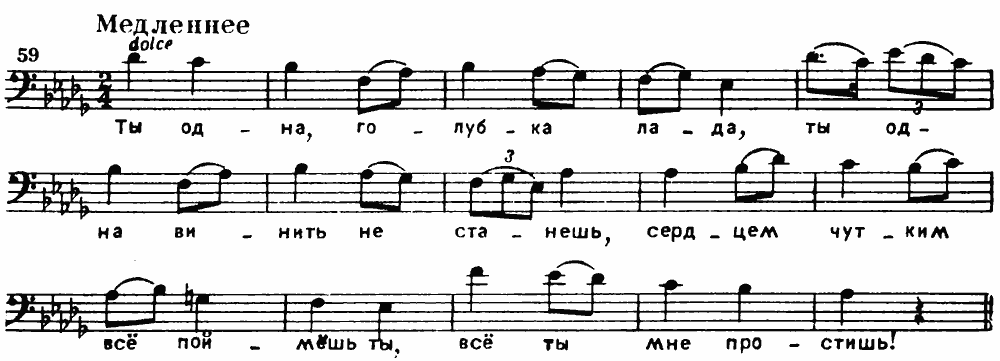
Prince Igor, Igor’s Aria (Thou, alone, my dove, my dearest) score
Then the theme of the severe mental anguish of the captive prince comes again. The heroic theme of the desire for freedom sounds even more dramatically and tensely. The sorrowful music of concentrated meditation (from the introduction to the aria) frames the entire aria symmetrically.
Baptized Polovtsian Ovlur talks with Prince Igor secretly, urging him to flee his captivity. Ovlur offers him a horse on which to escape. Igor refuses the offer at first, because he does not want to break the promise given to Khan Konchak, but then decides to think.
The morning comes. Khan Konchak returns from hunting. His great aria is a living characteristic of this wild, unbridled man and at the same time a brave warrior. Konchak is even noble in his own way, his attitude towards Igor is friendly. He offers Igor freedom if he promises not to wage war on him again, but Igor refuses saying he cannot lie. Konchak regrets that they were not born to be allies. “My Prince, my friend, thou art not my prisoner in this camp, but my guest, most dear to me. Hark then, believe me, I have always cherished respect for thy great courage in the field. I have honoured – yea, have loved – Igor for this. Therefore do not regard me as a foe, but rather as a hospitable host.” But Igor is honest. He responds directly and boldly, he will wage war on him again.
Konchak summons the Polovtsian slaves to entertain Igor and himself and offers Igor his choice of them. As the slaves dance the Polovtsians sing of Konchak’s glory. Their songs and dances are full of sadness and gentle charm.
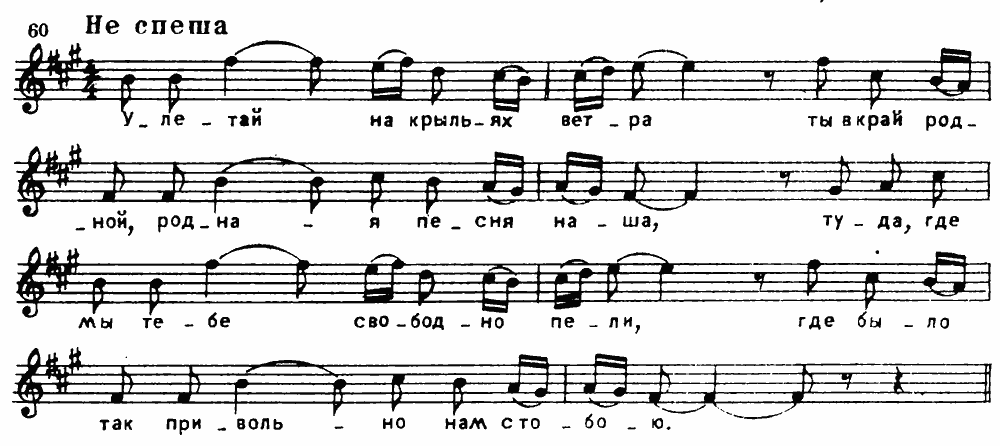
Prince Igor (Fly away on the wings of the wind) score
The thoughtful and dreamy song-dance “Fly away on the wings of the wind” is replaced by the wild, warlike dance of men in the rhythm of the lezginka. Then the general dance with the chorus glorifying the valor and strength of Khan follows. It is replaced by the flexible and easy boys’ dance. Then all these dances alternate and everything ends with a common climactic dance. “Polovtsian songs and dances” are a ballet vocal and orchestral suite, based on a truly symphonic development of different oriental images, that are sincere lyrical, courageous, belligerent.
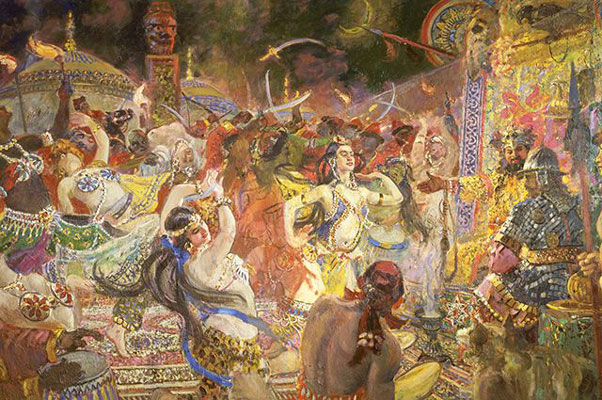
Polovtsian Dances. Artist: Alexander Gerasimov,1955.
Act III The Polovtsian camp
The great Khan Gzak rides in on horseback in triumph. The people welcome him with great rejoicing. Igor learns that his city was attacked. The Polovtsians bring in booty. There is feasting and celebration. Igor and his son Vladimir have their worst fears confirmed by the new captives. Vladimir and the other prisoners urge Igor to escape, but he is at first reluctant, singing of his shame and saying that it is the duty of the other Rus’ princes to save the homeland. Ovlur now arrives to say that he has prepared horses for Igor and Vladimir and Igor now agrees to escape. Igor urges his son to come, but Vladimir feels unable to leave Konchakovna who threatens to wake the camp. Igor tries to draw him away, but she clings to her lover. Igor seizes the opportunity and escapes. The young princess gives the alarm. When her father learns of Igor’s escape he is full of admiration for him. He orders his men not to pursue him but retains the young prince as hostage and gives him his daughter. The Polovtsians resolve to march upon Rus’.
Act IV Putivl is destroyed and left in ruins
Yaroslavna has lost all hope for Igor’s return and weeps over her husband’s loss.
Yaroslavna’s Lament arises from the old loud tears and lamentations with the characteristic intonations of the enlarged second and subtle melodic ornamentation:
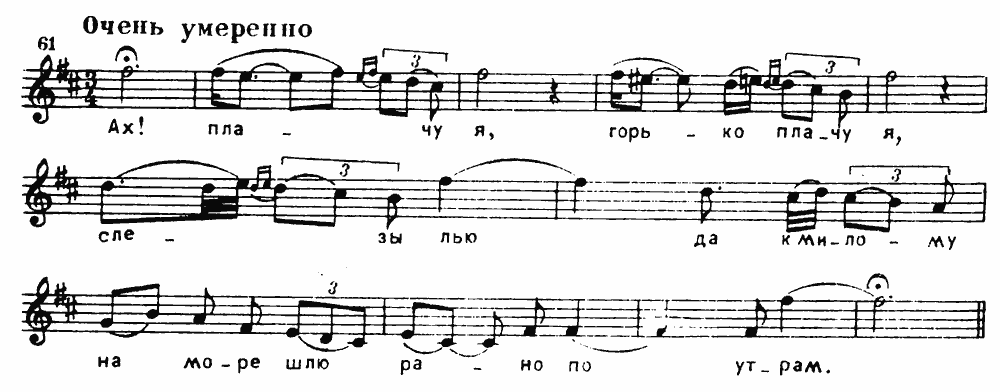
Prince Igor (Yaroslavna’s Lament) score
In her Lament Yaroslavna is depicted as a typical Russian woman, who is suffering the defeat of Igor’s army and the ruin of the region. Yaroslavna’s sorrow and anxiety are emphasized by her comparison with the unhappy cuckoo. This image is often found in Russian and Ukrainian folklore.
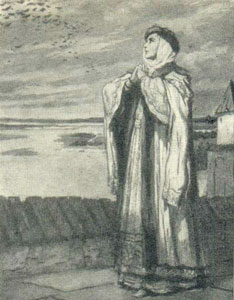
Yaroslavna’s Lament
The second theme of Lamentation “O, could I, like the cuckoo, fly along the banks…” is the same agitated lyrical melody as in the middle part of Igor’s aria. Yaroslavna’s appeal for the forces of nature – the wind, the sun, a wide and glorious river Dnepr – attaches to her image the native features of the ancient Slavic women. Not without reason her Lament and arioso “How ruinous and sad the land” merge with the chorus of the ruined village folks, Yaroslavna shares grief with the people.
One of the genius places of the opera is the choir of the village folks “Twas not the furious tempest-wind” in the manner of a chanting lingering song. Opening a monophonic song, the song gradually “overgrown” with expressive echoes. And in each next stanza the tune goes (as sometimes happens in folk singing) to the new first singer.
Yaroslavna sees two horsemen approaching. They are Igor and Ovlur, her joy is unbounded. Skula and Yeroshka, the drunken gudok players, catch sight of them. In order to escape deserved punishment for treason, the cunning Skula suggests to Yeroshka that they be the first to summon the people to share the joyous news with them. They hit upon the idea of ringing the town bell to summon a crowd. Although people at first treat them with suspicion, the gudok players manage to convince the crowd that Igor has returned and the boyars that they are loyal followers of the true prince and not Galitsky. All joyously celebrate Igor’s return.
Opera Prince Igor is one of the best creations of opera classics. The composer dedicated it to the memory of Glinka. It glorifies the heroic spirit of the people, their steadfastness, patriotism and spiritual beauty. The way of life of ancient Rus’ and semi-wild steppe nomads got a vivid embodiment. The opera enjoys the enduring success and the love of the broad masses of listeners.
ROMANCES AND SONGS
Borodin wrote eighteen romances and songs based on the texts of Pushkin, Nekrasov, Tolstoy, Heine, and some were based on his own poems. Borodin’s romances and songs are very different in content. Along with the pages of subtle poetic lyrics, they are characterized by the images of a powerful folk force Song of the Dark Woods (Pesnya tyomnovo lesa), and sometimes live and sharp humor. Borodin didn’t try, like Dargomyzhsky and Mussorgsky, to translate speech intonations into music. He took the general mood of the poem as basis. Flexible and expressive melody is in each song and romance in the foreground. A great artistic significance also belongs to the piano party, in which individual images of the poetic text often arise.
The romance For the Shores of Your Distant Homeland (Dlya beregov otchizny dal’noy) based on Pushkin’s poems, was created in 1881. The romance was written under the impression of Mussorgsky’s premature death. He was Borodin’s faithful friend and a comrade-in-arms for the common cause.
The music of the romance conveys a feeling of deep, restrained sorrow, caused by a heavy loss. Pushkin’s poem tells of the grief of the poet’s separation from his beloved, of her calling him to leave the “a land of sullen exile”, calling to where “the sky forever blue”, and how prematurely she “fell into the final sleep”.
The sad meaning of this poem is expressed in music simply and with restraint. Following Pushkin’s text, Borodin gave the romance a three-part structure. The first and third parts tell of a farewell meeting with the beloved and her death. Music is of a mournful, concentrated nature. The vocal part is stated in a sing-declamatory manner. The second intonations, alternating with soft moves per third are predominantly in it. The impression of spiritual stiffness is complemented by the piano accompaniment. Measuring discordant chords in a minor sound, basses dull and deep resound. The feeling of unavoidable impending misfortune is in all the numbness of grief:
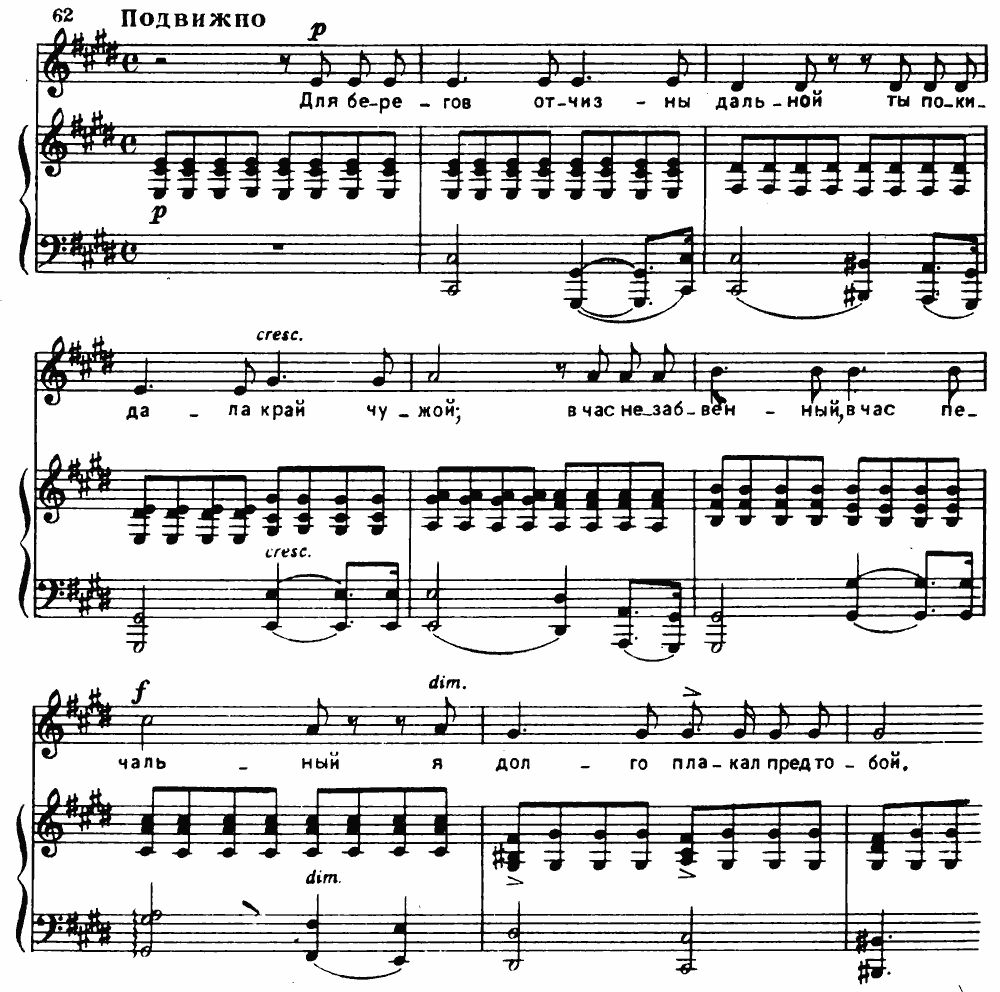
For the Shores of Your Distant Homeland score
The middle part of the story tells about the unfulfilled hopes of happiness and the distant beautiful land, in this part the music seems to lighten at times. The melody becomes less constrained. Minor sound is replaced by the major. However, the character of music remains sad and restrained. The romance ends with a recitative phrase on the main tonic foundation. In combination with discordant chords of accompaniment, it gives the music a tragic sound.
Borodin’s romances and songs of are a unique page of Russian vocal music. They have strong-willed images of a mighty young force Song of the Dark Woods (Pesnya tyomnovo lesa), the ballad The Sea (Morye), the profound wisdom of the fairy tale story The Sleeping Princess (Spyashchaya knyazhna), intense lyrical experiences My Songs are Filled with Poison (Otravoy polny moyi pyesni).
Borodin’s creativity is a treasure of Russian music. His written works are not numerous, but they covered almost all musical genres. Along with the profound transformation of the melodic structure of Russian folk music, an important place in Borodin’s work was occupied also by images of the East. The composer studied the authentic oriental tunes with interest, using their expressive features as lovingly as the Russian song intonations. An original melodic folklore of the Oriental peoples inspired Borodin to create vividly realistic images.
The historical events of the past, the stately heroic images of the Russian epic were reflected in the works of Borodin. His music is the embodiment of courage, bright optimism, epic grandeur combined with inspirational and gentle lyrics.
The traditions of Borodin found their continuation in the symphonies of Glazunov and partly of Kalinnikov. In the XX century Prokofiev, Shaporin and Sviridov were among his followers.
SHEET MUSIC:
You can find and download free scores of the composer:
Romances and Songs
- THE SLEEPING PRINCESS (SPYASHCHAYA KNYAZHNA) Dedicated to Nikolai Andreevich Rimsky-Korsakov
- THE SEA PRINCESS (MORSKAYA TSAR’YEVNA) Dedicated to Alexandra Egorovna Makovsky.
- SONG OF THE DARK WOODS (PESNYA TYOMNOVO LESA) Dedicated to Lyudmila Ivanovna Shestakova.
- THE FALSE NOTE (FAL’SHIVAYA NOTA) Dedicated to Modest Petrovich Mussorgsky.
- THE SEA (MOR’YE) Ballad (Third presentation). Dedicated to Vladimir Vasilievich Stasov.
- ARABIAN MELODY (ARABSKAYA MELODIYA)
Opera PRINCE IGOR
Opera in a prologue and 4 acts. Libretto by Alexander Borodin. For Voice and Piano.
PROLOGUE.
ACT I
SCENE I.
№2. The courtyard of Prince Vladimir Galitsky's house:
- Chorus
- Galitsky’s recitative and song
- Recitative
- Chorus of Maidens
- Scene
- Prince's song
- Chorus
SCENE II.
№4. Yaroslavna and Maidens Scene
№5. Yaroslavna and Vladimir Scene
ACT II
№7. Chorus of Polovtsian Maidens
№8. Dance of the Polovtsian Maidens
№10. Scene and Chorus
№11. Recitative and Cavatina of Vladimir Igorevich
№12. Duet (Konchakovna and Vladimir Igorevich)
№13. Prince Igor’s Aria
№14. Prince Igor and Ovlur Scene
№15. Khan Konchak’s Aria
№16. Recitative
№17. Polovtsian Dances (with chorus)
ACT III
№18. Polovtsian March
№19. Khan Konchak’s Song
№20. Recitative, chorus and scene
№21. Chorus and Dance
№22. Recitative (Ovlur approaches Prince Igor’s tent furtively)
№23. Trio (Konchakovna, Vladimir and Igor)
ACT IV
№25. Yaroslavna’s Lament
№27. Yaroslavna's Recitative and Duet with Igor
№28. Song of the gudok-players, scene and chorus
№29. Final Chorus
0 Comments